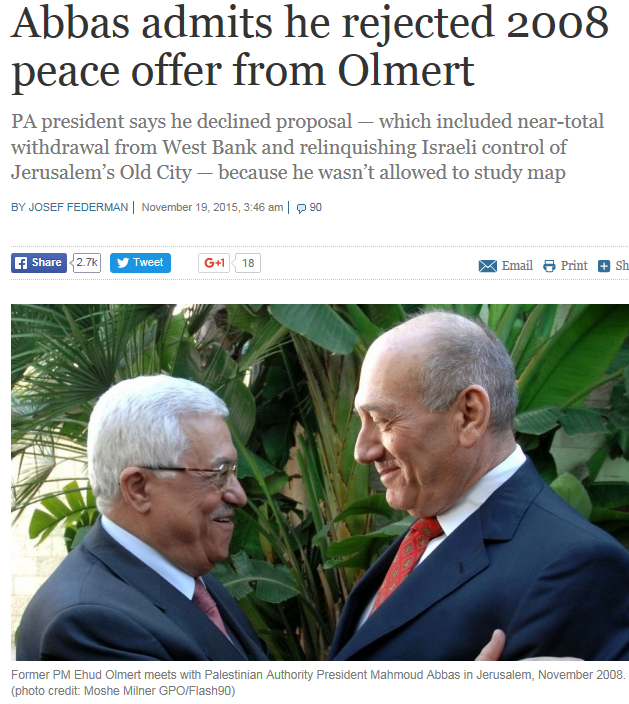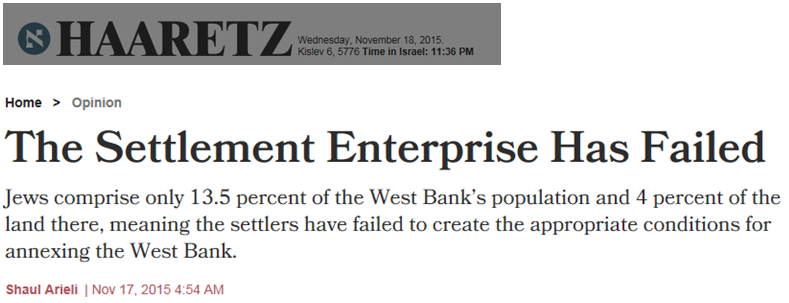By Michael J. Koplow
Last weekend, the Washington Post ran an op-ed by Steven Levitsky and Glen Weyl, professors respectively at Harvard and Chicago (which has made for a dangerous combination in the past), arguing for a boycott of Israel. Levitsky and Weyl, both self-identified as progressive Jews and lifelong Zionists, argue that because their support for Israel is predicated in part on the Jewish state embracing universal values of human rights, their observation that the occupation of the West Bank has become permanent dictates a boycott. They write that the purpose of a boycott is to pressure Israel into altering its strategic calculations and change its behavior; in their words, “Until Israel seriously engages with a peace process that either establishes a sovereign Palestinian state or grants full democratic citizenship to Palestinians living in a single state, we cannot continue to subsidize governments whose actions threaten Israel’s long-term survival.”
Given the pedigree and prominence of the authors, this particular call to boycott Israel has caused some consternation and drawn a variety of harsh responses, with some points of substance but mostly loud verbiage questioning the authors’ fitness to comment on Israel or diagnosing their allegedly selfish emotional motivations behind writing the op-ed. If you are looking for another ad hominem attack against Levitsky and Weyl or an investigation into their psyches, you needn’t read any further since one will not be forthcoming in this space. I am more interested in demonstrating why I think the particular arguments they make are inapt and figuring out how they arrived at the view of Israel that they espouse.
I am passingly acquainted with Levitsky personally from my days at Harvard, but I am intimately acquainted with his influential and excellent work on competitive authoritarianism. Competitive authoritarian regimes are ones where the authoritarian government holds elections that can theoretically result in the opposition coming to power, but the process is not free and fair and is heavily weighted in the regime’s favor. This work on competitive authoritarianism is part of a wider literature in political science recognizing that not only are elections not a sufficient condition for democracy, but that in many cases elections are part of a wider system of placing a democratic veneer on authoritarian government. A competitive authoritarian regime may look like a democracy but behind the scenes is actually working to unfairly perpetuate its own rule; think about Vladimir Putin’s Russia or Tayyip Erdoğan’s Turkey for a current snapshot of what that looks like.
I bring this up because in reading Levitsky and Weyl’s argument, it jumps out at me that they are taking Levitsky’s work on competitive authoritarian regimes and superimposing it – inappropriately, in my view – on Israel. From their vantage point, Israel is denying basic rights to Palestinians in the West Bank, growing the settler population, mistreating its Arab minority, and generally using its advantage over the Palestinians to ensure that they live in permanent subjugation. Much like a competitive authoritarian regime holds elections that can theoretically result in a change in government but only if the opposition overcomes the significant hurdles and unfair disadvantages that the ruling party places in its path, Levitsky and Weyl see Israel periodically engaging in a peace process that can theoretically result in a Palestinian state but placing too many hurdles in the way of such a process being successful. In short, while never explicitly writing it, Levitsky and Weyl view Israel as engaging in competitive authoritarian behavior in a number of ways.
It is thus unsurprising given Levitsky’s research showing that competitive authoritarian regimes with strong ties to the West respond to pressure to democratize that he and Weyl came up with the prescription that they did. They are convinced that by isolating Israel from the West and placing its financial and diplomatic ties to the U.S. in jeopardy, it will create sufficient pressure to get Israel to take the peace process seriously and step back from the brink in ending the occupation. As they write, “We recognize that some boycott advocates are driven by opposition to (and even hatred of) Israel. Our motivation is precisely the opposite: love for Israel and a desire to save it.”
I take the authors’ professed love for Israel at face value, but the problem with their plan to address Israel’s behavior through boycotts and sanctions is that their misdiagnosis of the situation leads them to prescribe medicine that will not cure this particular disease. One of the defining characteristics of authoritarian states is that the power to alter course is entirely in the hands of the regimes; not only is there an extreme power imbalance with respect to the opposition, but the regime holds all of the cards in terms of opening up to democracy and competition. Levitsky and Weyl proceed based on an assumption that pressure on Israel will ipso facto lead to the creation of a Palestinian state and the end of an Israeli presence in the West Bank because it is in Israel’s power to do so at will given the right set of incentives. While many, including me, do not view the current Israeli government as in any way serious about the two state solution, the fact remains that successive Palestinian leaders and governments have turned down Israeli offers of statehood without so much as a counter response. This is not a scenario in which Israel can snap its fingers and create a new reality, or one in which Israel is solely to blame for the situation that exists. Israel can and should do better, particularly when it comes to settlement activity, but it does not automatically follow that a boycott of Israel will address the problem at hand, and that is without even factoring in Israel’s legitimate security concerns.
Levitsky and Weyl address head on the common critique that boycotting Israel constitutes a double standard by acknowledging that, no, Israel is not the world’s worst human rights violators, but that they also feel far more invested in Israel’s future fate than they do of other states. As someone who spends his time working on Israel rather than on Bulgaria or Comoros, I empathize with this position, but it again overlooks a crucial reality. While Levitsky and Weyl may be motivated by genuine concerns, their course of action ends up being discriminatory in effect if not in intent far beyond their limited scope. It’s one thing for them to care about Israel more than they do about China, but it’s another to actively work to ensure that Israel is treated worse, particularly given the international environment that seizes upon such efforts to argue that Israel is in fact the world’s worst violator of human rights. Just because Levitsky and Weyl acknowledge that Israel is not a rogue nation without parallel does not mean that such understanding will extend to those with a very different agenda who seize upon their call to action.
I understand the frustration with the Israeli government, with the settlement enterprise, with illiberal trends in Israeli society, and with a Jewish state that speaks for Jews everywhere irrespective of whether all Jews want to cede to it that authority. But Israel is still a democracy, and to view it as an authoritarian actor that is susceptible to pressures that work on authoritarian states leads to poor policy prescriptions. A boycott is the wrong approach, both morally and practically, and Levitsky and Weyl’s op-ed is an example of the road to hell being paved with good intentions.
Dr. Michael Koplow is Israel Policy Forum’s newly announced Policy Director, based in Washington, DC.


















